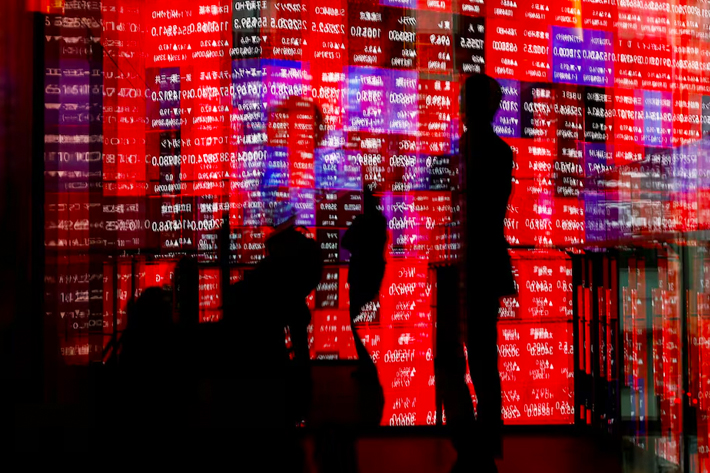Asian markets ended in the red on Friday as an overnight slump on Wall Street, dovish remarks from the US Fed on the timeline for rate cuts and a flare-up in tensions in the Middle East throttled investor sentiment.
Japan’s Nikkei was the worst hit, with the index logging its worst week since December 2022 as it tumbled nearly 2%.
The Japanese benchmark ended near a three-week low, below the 39,000 markets, weighed down by weakness in technology stocks on Wall Street’s lead.
Also on AF: US Wants ASML to ‘Cut Servicing to Some Chinese Chipmakers’
US equities slumped on Thursday after a a US Fed official said interest rates may not be cut this year.
Minneapolis Fed Bank President Neel Kashkari said while he had pencilled in two rate cuts for this year at the US central bank’s meeting last month, none may be required, if inflation continues to elude the Fed’s target.
“It’s the first time I’ve heard those kind of statements, so the markets sold off, and at the same time we had a flare-up in geopolitical tensions in the Middle East,” Mark Ellis, CEO of Nutshell Asset Management, said.
So far, however, there appears to be a healthy pullback in markets that had been grinding higher in a very tight trendline, making it look a bit stretched, Ellis said.
Still, Kashkari’s comments rattled the markets with Wall Street’s main stock indexes falling more than 1% each overnight.
US payroll data expected
Money markets are still pricing in about a 61% chance of at least a 25-basis-point rate-cut from the central bank in June, according to the CME FedWatch tool.
But the rate cut uncertainty soured mood across Asia. Aside from Nikkei, markets in Hong Kong, Seoul, Mumbai and Manila all slid. Korea’s Kospi shed more than 1%.
Bangkok and Jakarta remained flat, closing with small gains, and markets in China and Taiwan remained closed for a public holiday.
MSCI’s broadest index of Asia-Pacific shares outside Japan fell 0.45%. The index was set to end the week little changed.
Fed officials’ comments also supported the dollar against a basket of currencies, lifting it away from a two-week low hit after a downbeat US services survey.
Investors will now look out for US payroll numbers due later before the opening bell on Wall Street. Economists are expecting a rise of 200,000, compared with 275,000 in February, while the unemployment rate is likely to keep steady at 3.9%.
Critical point for Nikkei
Friday’s slump brought Nikkei’s weekly loss to 3.41%. It was a second straight weekly loss for the benchmark index, as it pulled back from an all-time high of 41,087.75 reached on March 22.
“The biggest factor for the Nikkei’s decline is technical,” Kazuo Kamitani, an equities strategist at Nomura Securities, said.
The 25-day moving average turned lower on Friday, meaning “there’s the risk that the Nikkei is in for another step down from here,” Kamitani said.
“The 25-day moving average has a mysterious gravitational pull, and is very much in focus for the market,” he added. “All of next week, stock market moves could be a bit volatile.”
Chip sector shares were among the biggest drags on Friday, with Tokyo Electron dropping 5.6% to shave 217 points from the Nikkei. Advantest erased another 81 points with a 4.85% decline.
Other notable losers included startup investor SoftBank Group, which slid 2.77%, and Uniqlo chain operator Fast Retailing, which skidded 2.26%.
Middle East tension heats up crude oil
Crude oil prices also weighed on global equities on Friday. The threat of supply disruptions from prolonged conflict in the Middle East kept Brent oil futures above $90 a barrel, a level not seen since last October.
Crude prices are heading for their second weekly gain.
Commodity and equity markets are digesting news that is Israel bracing for a possible retaliatory attack after its suspected killing of Iranian generals in Damascus this week.
US President Joe Biden has also threatened Prime Minister Benjamin Netanyahu he would condition support for Israel’s offensive in Gaza on it taking steps to protect aid workers and civilians.
Key figures
Tokyo – Nikkei 225 < DOWN 1.96% at 38,992.08 (close)
Hong Kong – Hang Seng Index < DOWN 0.01% at 16,723.92 (close)
Shanghai – Composite <> CLOSED
London – FTSE 100 < DOWN 1.05% at 7,891.83 (1156 GMT)
New York – Dow < DOWN 1.35% at 38,596.98 (Thursday close)
- Reuters, with additional editing by Vishakha Saxena
Also read:
Huawei Faces Trial in US for Iran Dealings, Trade Secrets
China EV-Maker Zeekr Restarts $500 Million US IPO Bid
TSMC Restarts Taiwan Fabs After Earthquake Shutdowns
























